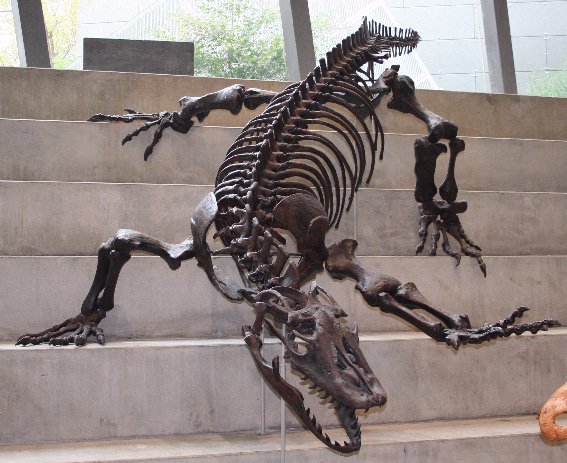|
| 질의: Varanus prisca | 결과: 2번째/2 | |
Megalania (Megalania prisca) - Wiki
| 제목: | Megalania (Megalania prisca) - Wiki
| |

| 해상도: 567x463
파일크기: 68670 Bytes
등록시간: 2007:09:20 19:42:10
|
Megalania
From Wikipedia, the free encyclopedia
[Photo] Megalania skeleton at Melbourne Museum. Author Cas Liber. Public domain
Megalania is an extinct giant monitor lizard. It was one of the megafauna that roamed southern Australia, and appears to have become extinct around 40,000 years ago. It was once thought to belong to a distinct monotypic genus and called Megalania prisca, (Greek Μ??γασ + ??λα??νω "giant roamer", "in reference to the terrestrial nature of the great Saurian" (Owen, 1859)). Its placement as a valid genus remains controversial, with many authors preferring sinking the genus into Varanus (Molnar, 2004), which encompasses all living monitor lizards. The first aboriginal settlers of Australia would certainly have encountered living Megalania.
Size of the Megalania
Lack of enough fossil material has made it very hard to determine the exact dimensions of Megalania . (Molnar, 2004). Conservative estimates place the length of the largest individuals at a little over 7 meters (23 ft), with a maximum conservative weight of approximately 1940 kg (4,268 lbs [Molnar, 2004]). Average sized specimens would have been a leaner, but still impressive, 320 kg (704 lbs). Megalania was the largest land-dwelling lizard to have ever lived, and a fearsome predator as well as a scavenger. Judging from its size, Megalania would feed mostly on medium to large sized animals, including any of the giant marsupials like Diprotodon along with other reptiles, small mammals, and birds and their eggs and chicks. It had heavily built limbs and body and a large skull complete with a small crest in between the eyes, and a jaw full of serrated blade-like teeth. Due to its size and similarities to the Komodo Dragon, a relationship between the two species has been suggested. In reality however, Megalania's closest living relative is the perentie, Australia's largest living lizard, not the Komodo Dragon.
Live Megalania
There have been numerous reports and rumors of living Megalania in Australia, and occasionally New Guinea, as recently as the mid 1990s. Australian cryptozoologist Rex Gilroy has stated that Megalania is still alive today, and it is only a matter of time until one comes in. Aside from stories and eyewitness accounts, the only evidence that Megalania might still be alive today is plaster casts of possible Megalania footprints that Gilroy made in 1979.
http://en.wikipedia.org/wiki/Megalania
| The text in this page is based on the copyrighted Wikipedia article shown in above URL. It is used under the GNU Free Documentation License. You may redistribute it, verbatim or modified, providing that you comply with the terms of the GFDL. |
|
^o^
동물그림창고 똑똑전화 누리집
^o^
|
|